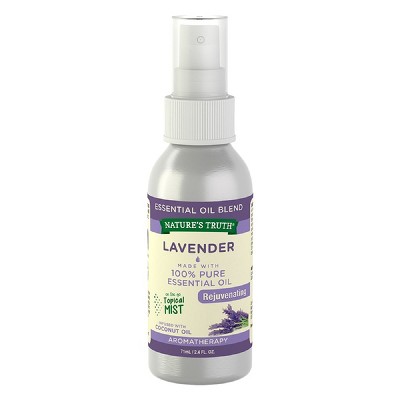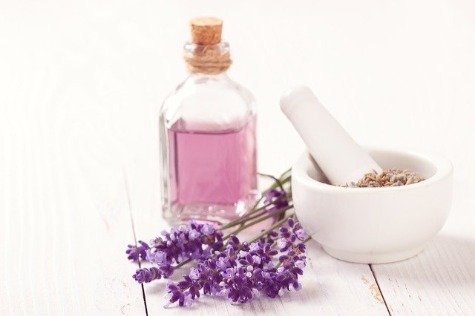We've called this article Aromatherapy 101 because we have packed so much into this article that we do think it will be your quick beginner's training course in this awesome subject!
Aromatherapy Benefits
An aromatherapy massage provides the most effective way of enjoying the therapeutic and psychological benefits of essential and carrier oils. Essential oils get directly absorbed into the bloodstream during a massage.
An aromatherapist should have undergone the right training to start a massage clinic.
It is soothing and calming, and restores balance and wellness. 
Aromatherapy is a therapy that recharges your body, mind and spirit!
In today’s stressful life, aromatherapy acts as a relaxing technique that energizes your body and gives a sense of peace to your mind. It is a practice where natural plant oils, including essential oils, are used for physical and psychological well-being.
Essential oil when used in aromatherapy not only relaxes mind and body but also provides health benefits ranging from instant relief from pain, headache or respiratory issues.
Aromatherapy being one of the most popular therapies assists the body to heal, regulate or maintain itself. Essential oil used in aromatherapy contains aromatic molecules that are easily absorbed by the skin or enter the lungs when inhaled.
These molecules are then carried by the blood system throughout the body thereby preventing any sort of disease or illness. Aromatherapy works naturally in a soothing manner creating positive emotions and lightening the atmosphere resulting in the elimination of false moods or negative emotions.
Aromatherapy Massage
If you feel stressed, overly tired and exhausted, need something that is good for your body and your psychology, and also if you want to relax and calm rather than a tiring muscle kneading massage, the answer will be an aromatherapy massage.
This massage, which has been given since the days of ancient Chinese, Egyptian and Indian civilizations, uses pure aromatic oils. Massages are a staple medicine in many cultures. In this country, various massage variants are offered, the relaxation of the body or an exotic experience to the goal. The classic massage has now been supplemented with Thai or foot reflexology.
These oils are obtained from special parts of plants such as roots, resin, leaves or blossoms, and have curative effects on both mental and physical systems and a very positive impact on the body.
The aromatic oils used in this massage can be tranquillizing or revitalizing, eliminate pain, detoxify, renew cells, stimulate or relax muscles, or create calmness in insomniacs, depending on the types of oils used.

As dependence on prescription opioid medications reaches an alarming high, many people suffering from conditions like chronic pain and anxiety are seeking relief from safer, natural home remedies, like essential oils.
Therapy Oils
Despite the name, these extracts (also known as “essential oils”) can either be administered by inhalation or applied directly to the skin. Aromatherapy is used to treat skin conditions, congestion, and infection. Essential oils like lavender are also used to aid relaxation.
Besides the effective use of peppermint in freshening breath, there is no scientific evidence that aromatherapy has a medical benefit, and many essential oils can be dangerous if administered incorrectly.
Essential oils aren't just for relaxing. You can even use essential oils at home for personal care.
Not sure which ones to buy?
Here's a list of recommendations:
- Bergamot – promotes healthy moods and overall wellness
- Chamomile – supports digestive health and relaxation
- Cypress – supports healthy circulation and overall wellness
- Eucalyptus – supports respiratory and skin health
- Geranium – balancing for the mind and body.
Many different oils can be used as the base for an aromatherapy massage.
Massage is done using a good massage oil. This consists of a carrier oil massage oil base , plus adding a few drops of the essential oil of your choice.
Animal Aroma Healing
The concept of animal aromatherapy is something that is relatively new. But it is slowly gaining attention from pet owners who want only the safest approach in treatment for their pets. In fact, essential oils can be used from your kittens at home to large animals such as cows and horses.
As with humans, it can be used to address health problems and common illnesses that animals go through. And, it can have the same emotional effects that humans experience upon exposure to the aromas of these natural oils.
Once the molecular substances of the oil penetrate the skin and enter the bloodstream, they travel to the brain and produce their corresponding action. Since the brain controls all the functions in the animal's body, your pet will be able to experience immediate and effective relief from the use of aromatherapy.
Uses of This Therapy
In clinical practice, aromatherapy is both a preventative approach as well as an active method to employ during acute and chronic stages of illness or disease. It must be administered by someone who has successfully completed advanced coursework in clinical aromatherapy coursework.
The aromas experienced through aromatherapy and essential oils have a dynamic effect on the mind and body. The effect is experienced through the sense of smell which is linked to the deepest parts of the brain governed by your basic instincts, thoughts and emotions.
On a physical level, essential oils help to ease muscular aches and pains, improve circulation, ease sinus congestion and act as a strong antioxidant.
Every essential oil is different from the other due to the difference in aromatic compound concentration in each oil. Therefore, they have different uses.
The difference in the process of extraction of the oil also causes a difference in the healing properties of the different oils. Some essential oils are ingested while some are applied directly to the skin.
Some oils are used in a bath while some are placed in a diffuser. The mode of usage of the oils may differ, but the goal of each oil is to heal the human body.
Sniffing perfumes, air fresheners or scented candles isn’t aromatherapy. True aromatherapy uses extracts from the leaves, stems and other parts of aromatic herbs. These extracts, which are called essential oils, contain the essence of the herb.
“It’s not the scent that can make your joints feel better,”
says wellness specialist Brenda Powell, MD.
“it’s the plant chemicals — the herbal components — that you take in through your skin or nose. These are what affect your body. ”essential oils are highly concentrated, so you only use a little at a time. They typically come in tiny bottles, which you can buy in pharmacies or health food stores.
With some knowledge and care, using essential oils is generally safe, and homemade aromatherapy products can sometimes replace commercial products that contain toxic ingredients. As in most fields, conflicting information and differences of opinion exist among “experts. ” Your responsibility in using essential oils is to learn as much as you can, make informed choices based on your individual circumstances, be willing to experiment, but always consult an expert if in doubt.
Aromatherapy Treatment
 If you need improvement in health problems from anxiety to poor sleep, you may want to consider aromatherapy. In this kind of treatment, you use extracts from plants called essential oils, by either breathing them through your nose or putting them on your skin. Some people put the oils on their skin when they get a massage or take a bath.
If you need improvement in health problems from anxiety to poor sleep, you may want to consider aromatherapy. In this kind of treatment, you use extracts from plants called essential oils, by either breathing them through your nose or putting them on your skin. Some people put the oils on their skin when they get a massage or take a bath.
Inhaled aromatherapy has become a popular, gentle treatment to reduce mild anxiety. It has also been tried for a variety of other conditions, including respiratory problems, post-surgical nausea, menstrual pain, and tension headaches. Topical treatment with essential oils has shown possible value for fungal infections and hair loss. Essential oils specifically designed for oral use have shown some promise for various digestive and respiratory problems.
Before offering treatment your therapist should:
- Establish client priorities.
- Access and review a client treatment plan.
- Discuss aromatherapy massage requirements and lifestyle factors with the client to identify treatment priorities.
- Review client medical history, and medications and obtain medical approval prior to treatment as required.
- Assess the client's skin condition and possible adverse reactions and discuss with the client.
- Identify contraindications to aromatherapy massage and refer a client to the appropriate professional as required.
- Assess the suitability of aromatherapy massage and the capacity of massage movements to meet client requirements.
- Design and recommend aromatherapy treatment. via Training.gov.au
Some say that aromatherapy can be a soothing treatment for bipolar disorder. Those affected by bipolar disorder, frequently referred to as manic depression, have severe mood swings with periods of feeling upbeat, bursting with energy and activity (the manic stage), to extreme lows, with depression, feelings of hopelessness, intense sadness, and lethargy.
This is much more extreme than the normal ups and downs most people experience in their daily lives. However, it seems reasonable that the use of organic compounds to improve your mood, mental state, or health might help those with bipolar disorder.
Like with Western medicine, you can use aromatherapy differently based on whether you're aiming to treat preventatively, or in the throes of pain.
Creating a wellness-oriented environment might not be a miracle cure, but as frequent migraine sufferers know all too well-sometimes it's the little things that help the big picture.
Though studies are sometimes small and not always well designed, the evidence is mounting that essential oils can be good medicine when it comes to easing symptoms of arthritis. Some studies have even found that arthritis patients who used aromatherapy were able to reduce their intake of painkillers while maintaining or improving their current level of comfort.
Massage especially gives physiological and psychological benefits for palliative care patients.
Don't Confuse this with Thai Oil Massage
Thai oil massage is about giving deep pressure, gliding, rolling, stroking, rubbing and stretching movements using the palms, thumbs, elbows and knees in combination with the application of (warmed) base oils (not necessarily special oils or so-called essential oils). A Thai traditional oil massage is, like a traditional Thai massage (without oils), based on the concepts of traditional Thai healing bodywork, that is working, opening, and stimulating the so-called energy lines, also called the sip sen or sen lines.
Aroma-therapy and Sleep
Some of the most common reasons that people use it for, according to research done by the PDQ Integrative Alternative, and Complementary Therapies Board, include:
- improving sleep quality, along with
- reducing stress,
- overcoming symptoms of depression,
- soothing sore joints and even
- battling the effects of cancer.
Aromatherapy massage can be particularly good for sleep problems, persistent period pains, digestive woes and eczema, but it’s not usually advised in pregnancy or for anyone with kidney problems, due to the potency of the essential oils.
Aromatherapy for Anxiety
Let the scent of love take you away! It can help improve mood and a general sense of well-being, which could be helpful in patients suffering from stress and anxiety.
Indeed, the results from Wilkinsons et al’s (1999) study with 103 cancer patients suggest that aromatherapy massage reduces anxiety in patients with advanced cancer.
Lavender oil is thought to have relaxing properties, so aromatherapists tend to use lavender oil on a client who is suffering from stress or anxiety. Lavender is also thought to act as an antiseptic on burns, acne and insect stings.
A major review published in 2000 focused on six studies investigating the treatment or prevention of anxiety with aromatherapy massage. Although the studies suggested that aromatherapy massage had a mild transient anxiolytic effect, the authors concluded that the research done at that time was not sufficiently rigorous or consistent to prove the effectiveness of aromatherapy in treating anxiety. This review excluded trials related to other effects of aromatherapy (such as pain control) and did not include any studies looking at the effects of odours that were not specifically labelled as aromatherapy.
Teaching can unfortunately be a highly stressful job with a great degree of burnout. Because of this stress, it is important to take care of oneself using good self-care. Aromatherapy can be a great component for self-care, as many essential oils can help reduce stress and anxiety.
We have already mentioned lavender. Some other oils for reducing stress are:
- clary sage,
- orange,
- cedarwood,
- vetiver,
- roman chamomile, and
- bergamot.
These oils can be used individually or blended. Some of my favorite blends are:.
In a case study, sixteen first-time mothers received a 30-minute aromatherapy massage two days after delivery, while 20 mothers received standard postpartum care. The aromatherapy massage group had significantly decreased ratings of postpartum blues and anxiety and had increased vigor and attachment to their babies.
Aromatherapy for Stress
Aromatherapy candles, bath products, essential oils, and other products are now widely available and have been touted as effective in soothing babies, relieving stress and promoting healthy living. But does aromatherapy live up to the claims?
Yes. Evidence shows that aromatherapy can alleviate symptoms associated with stress and relieve tension.
Stress is simply a part of daily life for almost every small business owner. When you’re wearing multiple hats, struggling with a limited budget and trying to stay one step ahead of the competition, you definitely need a few relaxation-inducing tools at your disposal to maintain your sanity.
Along with yoga, meditation and exercise, one of the most popular forms of stress relief is aromatherapy. A little background on aromatherapy while many believe that the use of aromatics for health benefits is “new age,” its roots actually can be traced back more than 6,000 years when ancient Egyptians burned incense made from aromatic woods, herbs and spices.
The primary reason for recurring headaches in most people is severe stress and anxiety. Studies have proved the possibility of getting rid of stress by using aromatherapy with peppermint and lavender oil. The mild sedative effect produced by the lavender can induce sound sleep and get rid of migraines or headaches caused by insomnia.
Regular use of aromatherapy is a gentle, effective way of maintaining good health. An aromatherapy bath is a wonderful way to end a stressful day!
How is Aromatherapy Regulated?
Advocates of aromatherapy claim that it’s effective in treating certain illnesses, preventing disease, and reducing stress.
The problem is that anyone can make claims. But, are they true? Regulation is needed so that the general public can be confident that the claims made are truthful and dishonest claims by some, don't ruin the reputation of a perfectly good product/ industry.
However, neither aromatherapy nor essential oils are regulated by any governmental body in the US or the UK, unless sold as a “drug”.
In the US, to ensure the safety of aromatherapy, the Food and Drug Administration (FDA) has set laws that prevent organizations from claiming essential oils will treat or cure any disease.
The crucial factor is a product's “intended use”.
What is the importance of “intended use” under the law?
How “aromatherapy” products are regulated depends mainly on how they are intended to be used.
The FDA determines a product’s intended use based on factors such as claims made in the labeling, on websites, and in advertising, as well as what consumers expect it to do. They say that they also look at how a product is marketed, not just a word or phrase taken out of context.
Finally, they say that they make decisions on a case-by-case basis on; “Is it a cosmetic?”
If a product is intended only to cleanse the body or to make a person more attractive, it’s a cosmetic. So, if a product such as a shower gel is intended only to cleanse the body, or a perfume or cologne is intended only to make a person smell good, it’s a cosmetic.
A product is legally considered a drug if it’s being sold for therapeutic use.
Massage oils and soaps or lotions, even if made of plant-based ingredients, are regulated by law as drugs if they are indicated for therapeutic treatment of pain, sleep problems, muscle aches, depression or anxiety.
Aromatherapy Scents
Catch a whiff of the air around you. How does it smell?
Is your mood immediately lifted by the smell of fresh-cut flowers? Or do you feel like throttled after being blasted with exhaust from the bus?
Put like that, it’s quite evident how incredibly powerful your sense of smell is and how it impacts your feelings. While you can distinguish more than 1 trillion different scents, aromatherapy is not just about appealing smells but it also offers a plethora of health benefits.
There are hundreds brands of odor and thousands of scents available nowadays in the world around us. Many are synthetic essential oils. With as many varieties of scents as natural essential oils they are perfect for combining with aroma, cold compress soap, creams, lotions, body lotions, body sprays, shower gels, and hand soap. They are versatile enough to use on their own or mixed for oil burners, simmering pots, lamp rings, and making incense.
The brain areas responsible for scent, emotion, and memory are closely related. Experts believe certain aromas trigger positive memories and feelings and may contribute to anxiety relief. Everyone has different personal associations with various scents. This, coupled with a certain level of belief in aromatherapy treatments, helps determine the amount of healing a particular person may experience.
How Long is a Course of Treatment?
A course of aromatherapy treatment can be as long or as short as you want to make it.
The effects of an aromatherapy massage can last up to 48 hours, depending on the oils used. The skin may feel slightly greasy, but the overall effect is one of deep calm and relaxation. It is not recommended to drive or drink alcohol after massage. You may be feeling too sleepy to drive, and some oils can increase the effect of alcohol, making you feel lightheaded after only one drink.
Very often, the benefits are immediately noticeable after a massage, but over time, it may be noticed that underlying or long-term problems have also been eased by massage. It is not recommended to have a full body massage more than once a week, but a weekly massage is an excellent way to keep the body relaxed and free of toxins.
An aromatherapy massage usually lasts between 60 to 90 minutes. You can ask for a shorter session if you feel this is too long.
Physical Benefits of This Type of Therapy
Massage has a profound effect on the sensory nervous system, stimulating blood flow and improving health and well-being. For the elderly, many of whom are touch-deprived, the benefits of massage go well beyond the physical.
Essential oils have been found to provide psychological and physical benefits when used correctly and safely. In addition to essential oils, aromatherapy encourages the use of other complementary natural ingredients including vegetable oils (also known as carrier oils) and hydrosols.
Aromatherapy massage not only has powerful physical, emotional and mental effects but it is also described as a great relaxing and rejuvenating experience.
Like the essential oils they are made from, many aromatherapy products may help to ease stress, boost energy and even improve physical health. The aroma triggers your olfactory sense, which will in turn enhance your circulation and help to bring about physical balance. Aromatherapy massage.
Conclusion
Aromatherapy is a powerful form of complementary medicine, yet its effectiveness and capabilities are often misunderstood.
Plants grow naturally and provide a complex chemistry in which the healing properties are stored and then extracted in the form of an essential oil.
The combination of chemicals in the oils, massage, and the event of attending, bathing, or just using one of the many products available, is usually beneficial.
Until more research data shows otherwise, this “artistic therapy” is surely a worthwhile pursuit. Especially, this is so when it is used by expert practitioners in combination with other holistic therapies such as massage to improve physical, psychological, and emotional well-being.
When used by in this way, these potent fragrant oils and scents presented in different forms are known to provide amazing health benefits, based on the aromatic effect they can have on the brain. It does seems to be a reasonable theory that when triggered to do so the brain can instruct the body to heal, based on the message it receives from a plant’s chemical makeup.
Use it wisely, and enjoy your Aromatherapy!
FAQs
What is Aromatherapy?
Aromatherapy is a practice that uses natural plant oils, including essential oils, for physical and psychological well-being. It involves the use of these oils in massages, inhalation, or direct application to the skin.
What are the benefits of Aromatherapy?
Aromatherapy provides numerous benefits, including improved circulation, hormone balance, relaxation, pain relief, and enhanced mental clarity. It can also improve sexual performance and overall wellness.
How does an Aromatherapy massage work?
An aromatherapy massage involves the use of essential and carrier oils that are absorbed into the bloodstream during the massage, providing both therapeutic and psychological benefits.
What essential oils are commonly used in Aromatherapy?
Common essential oils used in aromatherapy include lavender, peppermint, eucalyptus, chamomile, cypress, and bergamot, each offering unique health benefits.
Is Aromatherapy safe for everyone?
While aromatherapy is generally safe, it is important to consult with a trained aromatherapist, especially for individuals with specific health conditions or during pregnancy. Some essential oils can be potent and should be used with care.
Can Aromatherapy be used for pets?
Yes, aromatherapy can be used for pets. Essential oils can address health problems and emotional issues in animals, similar to their effects on humans. However, it is crucial to use the correct oils and consult with a professional.
How is Aromatherapy regulated?
In the US, aromatherapy products are regulated by the FDA based on their intended use. Products intended for therapeutic use are classified as drugs, while those for cleansing or cosmetic purposes are considered cosmetics.
What should I expect during an Aromatherapy treatment?
During an aromatherapy treatment, the therapist will use essential oils through massage or inhalation to address specific health issues. The treatment can help reduce anxiety, improve sleep, and provide relief from various ailments.
How long does an Aromatherapy massage last?
An aromatherapy massage typically lasts between 60 to 90 minutes. The effects of the massage can last up to 48 hours, providing deep relaxation and overall well-being.
Can Aromatherapy help with stress and anxiety?
Yes, aromatherapy can be very effective in reducing stress and anxiety. Essential oils like lavender, clary sage, and chamomile are commonly used to promote relaxation and improve mood.
What are the physical benefits of Aromatherapy massage?
Aromatherapy massage stimulates blood flow, improves circulation, eases muscular aches and pains, and can act as a strong antioxidant. It also enhances overall physical health and well-being.
Is there scientific evidence supporting the benefits of Aromatherapy?
While there is some scientific evidence supporting the benefits of aromatherapy, more research is needed. It is known to provide relief for certain conditions and enhance overall well-being, but its effectiveness can vary.
[First published Feb 9, 2020.]



